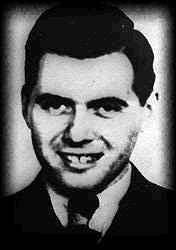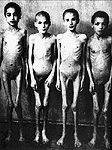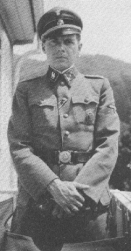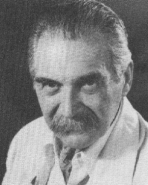|

On the date of March 16, 1911 the eldest son was born to a Catholic
couple named Karl and Walburga Mengele in the Bavarian village of Gunzburg.
Karl and Walburga decided to name their new baby boy, Josef
Mengele. Josef grew up in a
hope not seeing much of his family.
By October 1930, Josef left Gunzburg to start his college degree
majoring in Philosophy and Medicine at Munich University.
The year 1938 was a long one for Mengele.
In this year, the month of May, he applied for membership and was
accepted into the Schutzstaffel, or SS.
It was also in 1938 Frankfurt University awarded Mengele his
medical degree. The same year
was the year Mengele had his first experience in military training,
spending three months training for combat with the Wehrmacht,
or the German Army. For the
rest of 1938 until 1940 Mengele remained with the Institute, assisting von
Verschuer and reviewing the work of other researchers.
It wasn't until 1939 that war broke out, and Mengele was electrified
with hope of fighting for Father Germany.
Mengele wasn't disappointed; although he had to wait until June of
1940 due to he prior kidney ailment, he was accepted to the Waffen SS,
elite soldiers within the SS itself, and most fanatical adherents to
Hitler call to preserve and protect the German race.
In the words of several eyewitnesses, survivors, and of historians
and psychologists,
"Dr. Josef Mengele was not merely of Auschwitz, Dr. Josef
Mengele was Auschwitz."
Through his actions and behavior, Mengele was able to embody the unearthy
contradictions of death camp where arriving prisoners were serenaded with
Waltz music played by a prisoner orchestra, while a few yards away
hundreds of people were reduced to ash in the crematoria; a camp where
affection and comfort were lavished upon the children living in the Zoo,
only so as to keep them healthy enough for "twisted and pointless
experimentations"; a camp where Mengele himself escorted his
"beloved children" to the gas chamber, referring to their walks
as a game he liked to call "on the way to the chimney."
The death factory at Auschwitz was a gruesome kingdom of human
misery. Barracks and their
inhabitants were invaded with the foulest of sanitary conditions.
Diseases such as typhus and diarrhea were rampant, as were lice,
vermin and fleas. It was over
this kingdom which Dr. Josef Mengele sought to preside.
Mengele's stated mission at Auchwitz was to perform research on
human genetics. His work was
funded through a grant that Professor von Verschver had secured through
the German Research Council in August of 1943.
The goal of Mengele's work was to unlock the secrets of genetic
engineering inferior gene strands from the human population as a means to
creating a Germanic super-race. Despite
the scientific premise for his work, Josef accomplishments added volumes
to the annals of human cruelty while contributing nothing of value to the
greater understanding of human genetics and engineering.
While at Auschwitz the established his reputation as a
"ruthless, cold-blooded killer" whose name inspired fear even in
the SS officers. His
reputation ended up giving him the nickname, Angel of Death.
He immediately demonstrated a deep capacity for wanton murder
during a typhus epidemic that broke out in the camp just days after he had
arrived to the camp. He
ordered a thousand Gypsy men and women who had the disease to the gas
chamber, while sparing the lives of German Gypsies.
Inmate- doctor Gisella Perl recalls an incident when Mengele caught
a woman in her sixth attempt to escape from a truck transporting victims
to the gas chamber:
"He
grabbed her by the neck and proceeded to beat her to a bloody pulp.
He hit her, slapped her, boxed her, always her head-- screaming at
the top of his voice, 'You want to escape don't you?
You can't escape now! You're
going to burn like the others, you are going to croak, you dirty Jew!.'
As I watched, I saw her two beautiful, intelligent eyes disappear
under a layer of blood. And
in a few seconds, her straight, pointed nose was a flat, broken, bleeding
mass. Half an hour later, Dr.
Josef Mengele returned to the hospital.
He took a piece of perfume soap out of his bag, and whistling gaily
with a smile of a deep satisfaction on his face, he began to wash his
hands."
Around other women Mengele acted charming and sweet, then only
moments later he sent them to the gas chamber.
In addition to the selection and beatings, Mengele occupied his
time with other numerous acts of the most base cruelty, including the
dissection of live infants; the castration of boys and men without the use
of any kind of anesthetic; and the administering of high-voltage electric
shocks to women inmates under the auspices of testing their endurance.
On one occasion Mengele even sterilized a group of Polish nuns with
a X-ray machine, leaving the celibate women horribly burned.
In 1981 the Western German Prosecutor's Office drew up 78
different inditments against Mengele, charging him with the most heinous
and bestial crimes against humanity.
Dr. Josef Mengele fled Auschwitz on January 17, 1945, as the Soviet
army advanced across the crumbling German Reich towards Berlin. During the first few years of the post-war era, Mengele
remained in hiding on a farm near his native Gunzburg.
He assumed a fake identity, and worked as a farm hand, keeping
informed of events through secret contacts with old Gunzburg friends.
Incredibly, he at first aspired to continue his career as a
research scientist, but it became increasingly apparent that the Allies
weren't going to let a notorious war criminal such as he simply resume the
life he had enjoyed prior to the war without paying for the crimes he had
committed during it. Mengele
finally decided that he was no longer safe in Europe and escaped through
Italy to an ocean liner bound for Argentina.
Mengele arrived in Argentina in 1949.
Mengele was to spend the next thirty years on the run from
international authorities.
Many still live for the day when they will be able to extract
justice for their suffering from the man who was responsible for so much
of it, both during and after the war.
Alas, Mengele has escaped he sought to wield total control-- death
itself.
 |
 |
| Picture of Josef
Mengele. |
Children from the Holocaust that have
become only skin and bone from not eating anything but bread and
water. |
|

|

|
|
Josef as a Waffen SS Officer. |
Photo for Josef's false ID card. |
|




